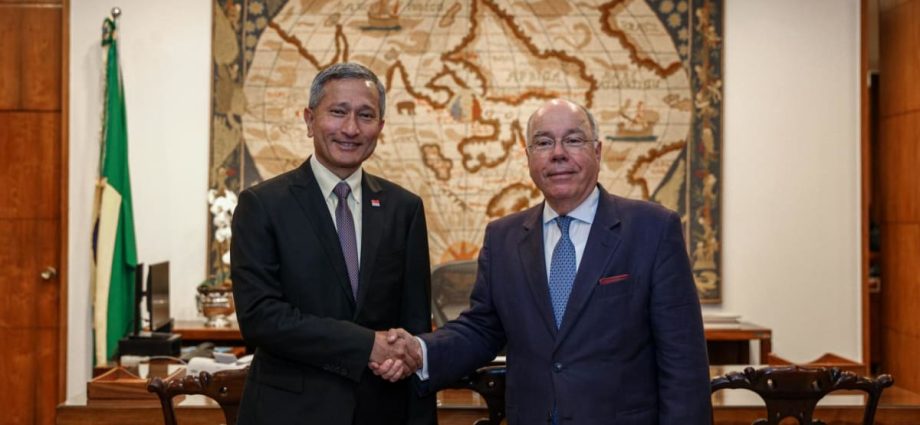
Under Article 6 of the Paris Agreement, countries “will be able to transfer carbon credits earned from the reduction of global greenhouse gas emissions to help one or more countries meet climate targets”.
Dr Balakrishnan and Mr Vieira also recognised and agreed on the importance of ensuring that the energy transition and mitigation of emissions in the energy sector at domestic and global levels occur in a “fair and equitable” manner, said MFA.
“The ministers agreed to promote bilateral dialogue on these topics, as well as research and development, investments in renewable energy resources, and the decarbonisation of the transport sector, such as through the use of cleaner energy and low-carbon fuels, including sustainable biofuels.”
On Brazil’s bid to host COP30 in Belem in 2025, Dr Balakrishnan expressed Singapore’s support.
“I am certain that Brazil will have the capacity, the experience, the commitment and the moral authority to bring us to a successful COP-30,” he said.
The ministers also welcomed the rapid growth in trade and investments between Singapore and Brazil in recent years, with Dr Balakrishnan adding that the relationship between both countries has “grown exponentially”.
“Singapore’s relationship with Brazil is dynamic and forward-looking, based on a very strong foundation of trust, mutual respect and goodwill. We are looking forward to the opportunities of the future,” he said.
BRAZIL A KEY FOOD SOURCE MARKET FOR SINGAPORE
Brazil is Singapore’s largest trading partner in Latin America and it is likewise in Southeast Asia, according to MFA.
Dr Balakrishnan also noted that trade between both countries has grown exponentially, particularly over the past decade, and in 2022, bilateral trade in goods grew more than 70 per cent year-on-year amid the COVID-19 pandemic.
Both ministers acknowledged Singapore’s investments in the development of Brazil’s infrastructure and logistics, and its role as a hub for Brazilian businesses in Southeast Asia.
“As a land-scarce city-state, Singapore relies heavily on food imports from Brazil for a wide range of our protein needs. In fact, Brazil is a key source market for us, so this is a matter of survival,” said Dr Balakrishnan.
“I have to also acknowledge that Singapore is a tiny island city-state. In terms of geographical size, we are just half the size of the city of Sao Paulo. We look to Brazil as a partner of choice for deepening our cooperation across Latin America.”
Singapore buys more meat from Brazil than any other country. For example, Singapore imported 214,400 tonnes of chicken in 2021 and about 48 per cent of those chickens were from Brazil. Brazil was also Singapore’s top supplier of pork and beef in 2021.

